Mother-child relations can be a rollercoaster journey. When we are 5 we assume mums know everything, but then we turn 13 and we think they know nothing.
Now that we are adults ourselves (some of us with kids of our own), we can hopefully understand that what mums do or don’t know is actually invaluable.
It is a shame it takes so long for us to figure this out, but many of us have so much to learn from our Mums. With Mother’s Day fast approaching, our Select Opinions Leaders poll asked the questions to find out what impacts our relationships with our mothers, how our relationships change with age, and importantly, what valuable lessons can we learn from our mums?
Things We’ve Come To Realise About Mums….
Mums have the potential to be our best friend…
The majority of Australians say they have a positive relationship with their mother (84%) and most also believe that their relationship has changed since they were younger; with over half (52%) stating it has improved with time.
The stages that mothers have to go through with their children are a testament to their adaptability, as concisely explained by this respondent;
“Mum knew how to take care of me as a child, learned to rope in a rebellious teenager, and now knows to step back and let her adult daughter make her own decisions”.
According to the poll, sons are more likely to have a positive relationship with their mums (91%) compared to daughters (81%). Thinking back to childhood, men showed they were more likely to have considered their mum a friend (rating 6.2 out of 10 on a scale, compared to 5.5 for girls) and in recalling their teen years, again men felt more likely to have regarded their mum as a friend (rating 5.9 out of 10 on a scale, compared to 5.2 for girls)
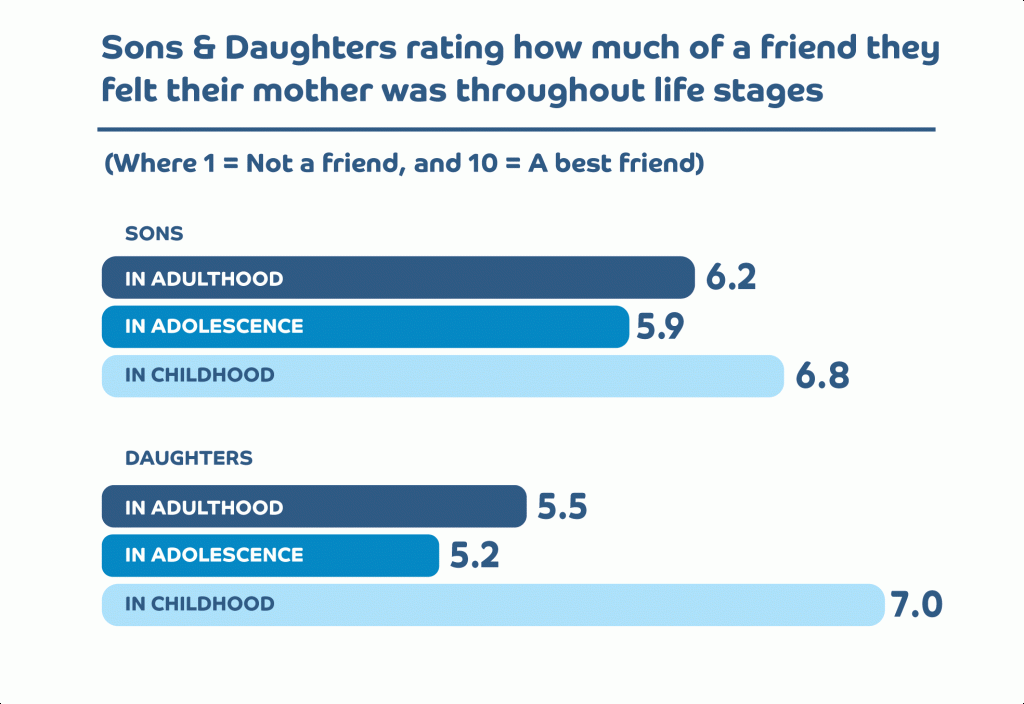
In adulthood however is where the mother/daughter friendship shifts and comes into its own – with women rating an average of 7 out of 10 for the friendship they feel with their mums (where 10 equals ‘a best friend’). Men also regard their mums highly as friends in adulthood, rating an average of 6.8. It appears the mother-son friendship went up a just under a point from teen years, where the mother-daughter friendship went up nearly two points as teens turned to adults.
“It changed from mum being mum, to mum being a friend as well”
This could be a reflection of the growth in relationship and perspective from both sides as daughters stated a 21% jump in their mother taking into consideration their point of view when advising from teenage years to adulthood compared to a 12% change for sons.
Mums Teach Us That Hindsight is a Beautiful Thing
Unsurprisingly, the rates of those with a positive relationship with their mother are significantly lower for those under the age of 25. The journey from guardian-child relationship to something like best friends can be a tumultuous ride, and we have to appreciate that these roles can be difficult for both sides to let go and grow…
“Although she still sees me as a kid, she has somehow ‘released my hand’ and let me find my way in the world, supporting me from afar”.
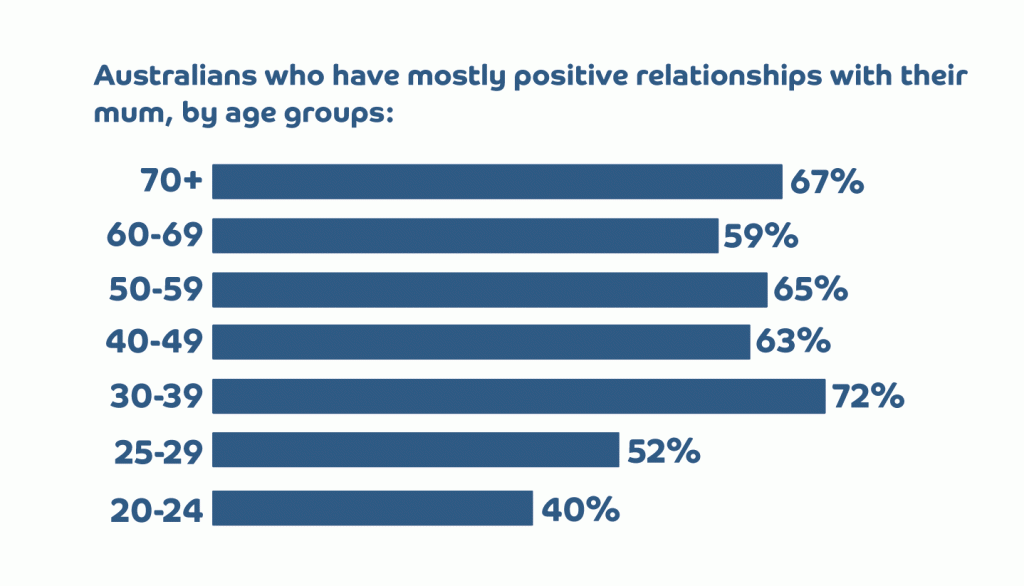
So when can we expect things to level out? The age that we’re most likely to find positivity with our mothers is in the 35 to 49 year old age bracket. No doubt maturity beyond our teenage and young adult years assists greatly in coming to appreciate our mother’s actions, as summarised by this respondent;
“As I grew up and matured, I realised my mum was not the enemy. She was always there to be supportive and strong, and help me through life. I realise that now that I have my own children, more than ever”.
The beauty of hindsight and appreciation – in fact 52% of respondents gave this exact reason to describe how their relationship with their mother has been able to improve in their adulthood.
When asked if their Mothers’ method of disciplining was fair during teenage years, there appears to be a different reaction from respondents who are aged under 30 compared to the generation aged 40+. Under 30’s were more likely to look back on their teenage years and say their mum’s disciplining was unfair (59%) while those over 40, with what we believe is the benefit of hindsight, see their mums disciplining as more reasonable with 76% of 40+ year old’s believing the methods to be fair.
Along with hindsight, experiencing parenthood for oneself made one more likely to view their mother’s discipline as fair. Having children of their own was a factor that nearly half of respondents contributed as changing their relationship with their mum for the better (49%). Many have increased contact with their mother since becoming a parent (64%) and may also find themselves relying on her more so (43%).
Mum’s opinion on how her grandchildren are being raised can sometimes stir the pot, but nearly half of us stated that our mother supports us in the way in which we choose to raise our children (48%). 27% state their mother regularly looks after their child and an additional 38% of mothers do so on a sometimes basis. Additionally, Mum’s experience in child rearing is being utilised by some – 39% state they are following suggestions from their mother on this topic.
Mums Are Great To Turn To For Perspective…
“Hey Siri, where do I get free, honest and personally-tailored advice?”
Sometimes it can be a lot more helpful to say ‘Hey Mum?” than to say “Hey Siri?”. Both Mum and Siri have the propensity to answer your question with a question, interrupt you at inappropriate times, or become easily confused by the problems you may be facing.
Siri actually knows how to work an iPhone so may be quicker off the mark, but Mums usually have the advantage of having a deep understanding of your traits and personality. Plus, mums may have encountered a similar issue before and more often than not they genuinely want you to be happy. In fact, over half of our respondents stated that realising their Mum’s life experience had value was a factor in their change in relationship for the better (53%).
It turns out as adults we’re quite comfortable having serious chit-chats with our mothers – it seems a large number of respondents are confiding in their mum about life issues (72%). This is quite a jump from only 49% who felt comfortable in discussing topics with their mum as teenagers. A third (33%) of respondents described their teenage years as having a mother who was “caring and stern but not someone I felt comfortable talking with about issues in my life”.
These are the times that we probably could have done with the most guidance navigating our teen years, yet the rates at which we discuss certain topics with our mums has increased significantly from adolescence to adulthood…
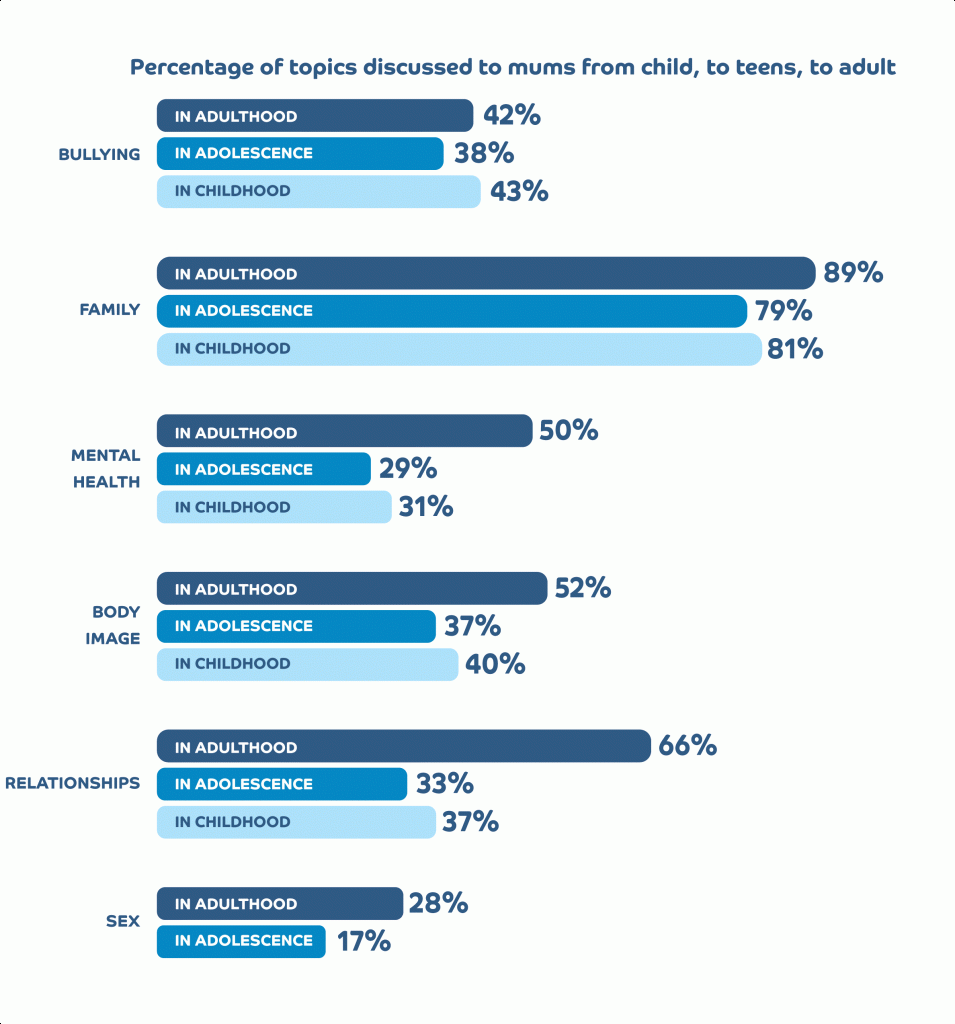
According to the poll, the number of adult Australians talking to their mothers about sex has risen from 17% since when they were a teenager to 28% as an adult. A similar effect can be said for the topics of relationships (which has doubled from 33% as teens to 66% as adults), mental health (from 29% to 50%) and body image (37% to 52%).
People Aren’t Perfect And Neither Are Mums
Imagine if you had 100% perfect parents. That would be difficult to live up to. The process of realising that our mums are not perfect is destabilising but necessary. “I came to realise that like all of us, she had her flaws too, and her word and her ways were not the be all and end all”. It becomes a lot easier to take on their advice when you don’t have to.
Somehow, mums have the potential to go from being our archnemesis to our best friend – which can be a bit of a process. According to our respondents, learning to value what our mothers did for us as children is the most common contributor to converting the relationship (60%). This was closely followed by simply realising that she was just human and doing what she thought was the best for us (54%).
“My relationship with mum has gone through highs and lows. I became a lot closer to (her) after I learned to see things from her point of view”.
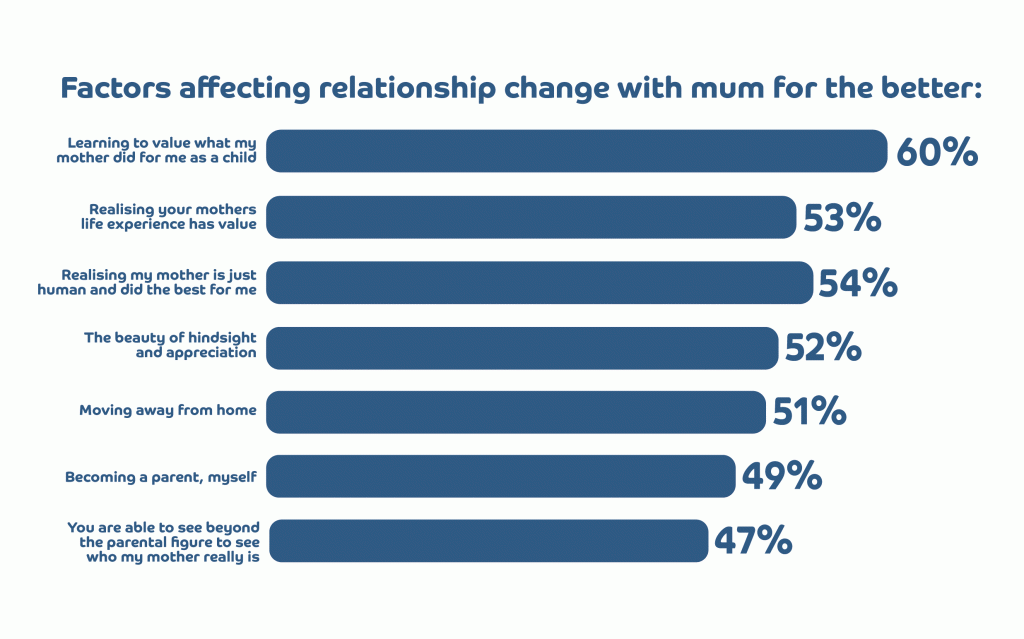
In childhood we are all nearly solely reliant on our mums (95%) but this reliance naturally decreased as we become teenagers (85%) to then young adults (64%), and then mature adults (50%).
However just because we grow older doesn’t mean we need our mum less, when it comes to big life decisions, we rely on our mums 58% of the time, and in difficult times it jumps to an average of 70%. It just goes to show, no matter how old we get we always need our mum.
Mums Need To Be A Little Bit Annoying…
It comes with the job.
Sometimes as adults we indulge the idea of the ‘annoying mother’. You know, we may regularly complain about their neediness, their unsolicited judgements, or their irrational worrying.
As you might expect, our polling suggests that the vast majority of people have their mothers as a part of their lives (87%), so when you hear constant complaining it’s easy to wonder if people do actually like their mothers, or if it’s more of an endured and accepted relationship…
Reflecting on these relationships, the majority of participants seem to be taking the good with the bad, accepting that mums can really rile us, yet also make us feel safe and cared for. When asked to choose words to describe their mothers, participants provided these as the most common responses; reliable, bossy, protective, frustrating, selfless, annoying and supportive.
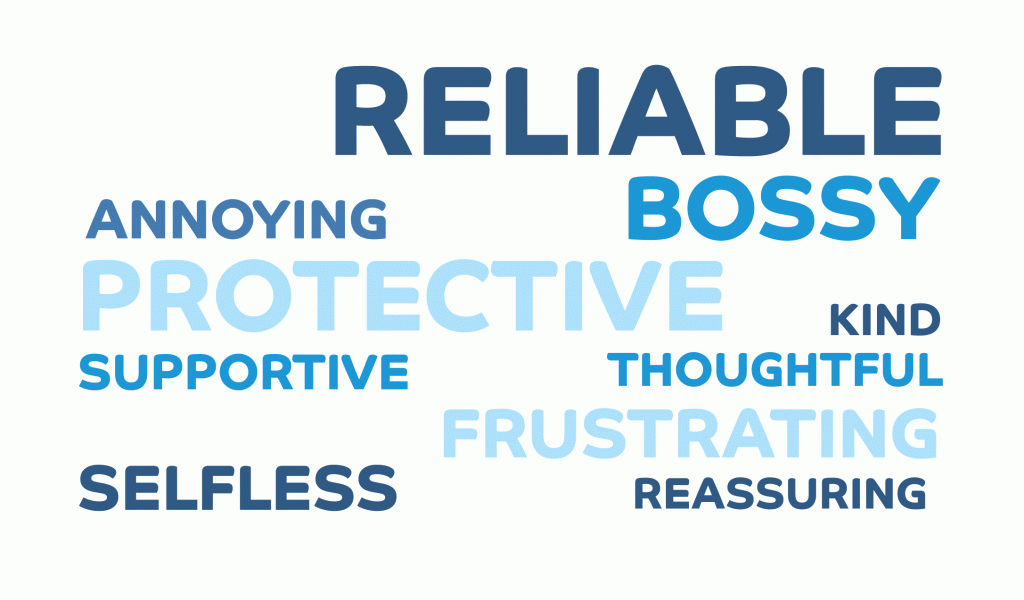
Mothers can be both an absolute necessity whilst at the same time a huge annoyance is all part of the balance of them seeing us as responsible adults, and us seeing them as a caring peer rather than authoritarian.
It’s hard – even as fully-fledged adults, when asked to rate their mothers as authoritative figures in their lives, the average score was still 4.9 out of ten, proving that mums definitely still have a lot of sway with us. This is compared to our teenage selves who scored our mums a 6.7 out of ten.
Sometimes their selflessness can be frustrating, or their bossiness comes from the need to protect you. Sometimes they are annoying – but we personally find that this is more likely when they are trying to support us or need some support themselves. Or just when they need to do anything “fancy” with the tv.
They Treat All Their Children With Fairness
All the middle kids can calm down because we found no evidence of any differences between the youngest, middle, or eldest children in terms of having a positive relationship with their mothers.
That being said, three quarters of respondents did state that they thought their relationship with their mother was different to that of their siblings (75%), and when asked who was the closest to their mother, the majority said it was themselves (57%).
Additionally, the youngest child was much more likely to claim they were much closer to their mother than their siblings (41%), compared to a middle child (25%) or an eldest (30%).
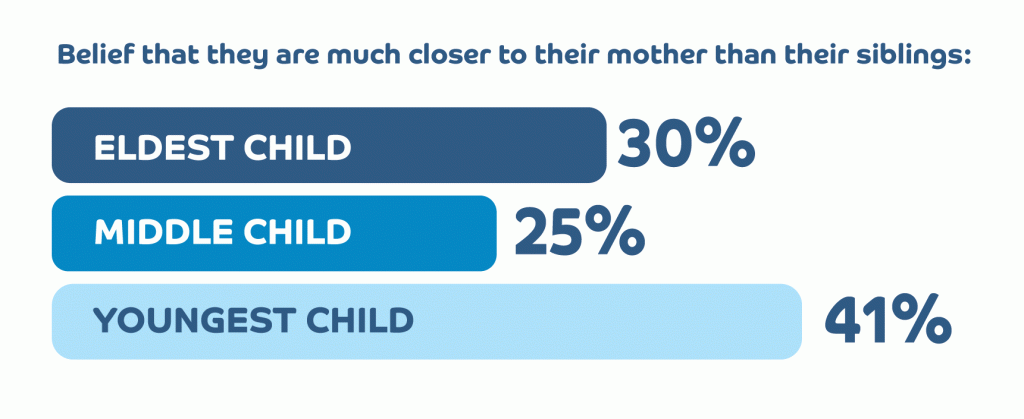
In looking back to childhood, youngest children were more likely to say that they sought out mother-child bonding time, compared to elder siblings (40% compared to 27% of eldest children). This trend continues into adulthood (52% of youngest children seeking out time with mum, compared to just 40% of eldest), which probably explains why youngest children also more frequently stated that in adulthood they have become friends with their mum (38%, compared to 28% of eldest children).
As for treating all her children fairly, we found that collectively 77% felt that their mothers were fair in their discipline or advice when they were children (and yes this includes the middle children, who actually reported slightly higher than the other siblings in terms of the justice they got from mum).
In Conclusion, Call Your Mum…
So, how would you sum up how your relationship with your mother has evolved?
“The relationship grew as I grew”.
Sometimes the answer is a simple one. We grow into teenagers and then into adults, grow into maturity and grow to see perspective. And that seems to be the easiest way for us to understand, appreciate and even enjoy our mothers and everything they may have sacrificed.
As an adult, 84% of us are cherishing the times we share with our mother. Whether it is to simply share a conversation about our day to day lives, share a meal, or a drink. Yet, only two thirds feel we are now able to make enough time for their mother, but where does that leave a third of mothers?
At some point we have to say goodbye to our mums forever, and we feel for those who will have Mother’s Day without their mums this year. We hope that their words remind us all what a wonderful thing this relationship can be, and to hopefully find appreciation in it before we don’t have the chance.
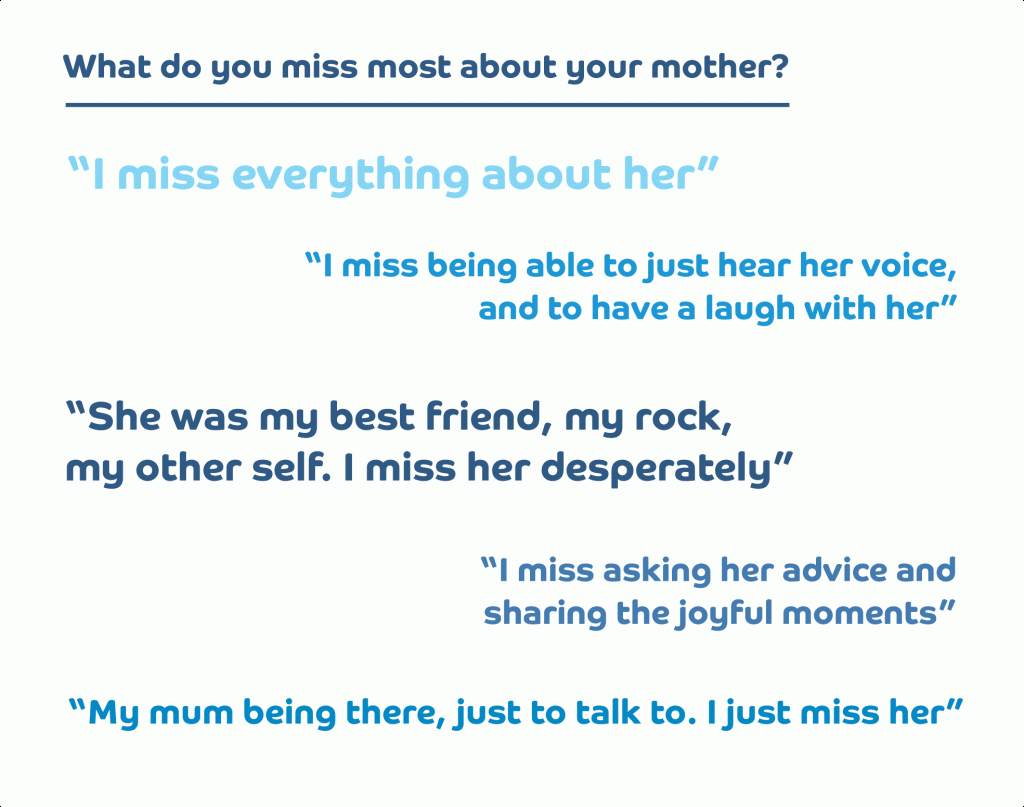
If you can, call your mum this Mother’s Day – you might be still in the process of finding a balance in your relationship, but even if they sometimes have a funny way of showing it, we think they might love it if you do.
Happy Mother’s Day to my beautiful, supportive and loving mum, who I couldn’t do life without. I love you always.
Ekas spoke to 544 members on it’s panel Select Opinion Leaders in April 2021.
